Don't wanna be here? Send us removal request.
Text
https://x.com/i/status/1923046330529689738

I really hope they share more of these.
40 notes
·
View notes
Text

We shared a vision, Vander. A dream of freedom - not just for the Lanes, but the whole of the Underground united as one. The nation of Zaun.
304 notes
·
View notes
Text
Thinking about Mel's introduction scene, and how much it says about her, and I love it.
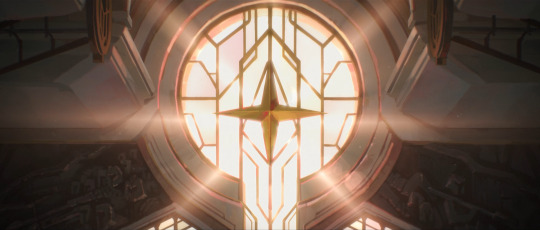
It starts off with her family crest. Of course, the viewer doesn't know what it is right away, just that it's a symbol and that it's important. But as the show goes on, we find out what it means.
But yeah, right from the beginning, before we see Mel or anyone else in this scene, it's the Medarda symbol, these images of war, and the sun. And the camera holds this shot for a good few seconds. It's an important image. This right here is provides the entire outline of Mel's story: the centrality of her relationship with her family; the way her life has been, and will continue to be, shaped by the drive to war. And underneath it, this bright, shining power, waiting to be let out. It's so good.
We get the first lines of dialogue
Elora: The House Ferros received your letter. They insist business is steady.
Mel: Steady is stagnant, Elora.
So we know that Mel is an investor, and that she has big goals, which she is not reaching.
Then the next shot.

The scenes of war, the crest, the sun, they take up a huge portion of the backdrop. Mel is in the centre, she's in the light, she's the tallest one in the shot, she's important, she's in control. But she's dwarfed by her backdrop.
We also see that this is not the typical kind of Piltover architectural design. There's these big rocky outcroppings, splashed with a red mineral. They're these aggressive, organic shapes, breaking into what is otherwise a curated space. Even though Mel is being depicted as the master of this space, there's an immediate tension.
Elora: They wished me to remind you that it's thanks to their innovations that you are the richest person in Piltover.
Me: Yet I remain the poorest Medarda.
This builds on the last bit of dialogue. She's an investor. Not only that, she invests in technology and innovation. And she's a successful one. And she's very rich.
But it's not enough for her. She's not reaching her goal. Whatever she's attained doesn't matter to her. She doesn't care about the money, what she cares about is where she stands in relation to her family.
So then the salesman comes in. This short little guy, who's fawning over Mel, and can't even keep her attention. Again contributing to the sense of what an important figure Mel is.
And we find out that Mel like puzzles. :)
And then,
Mel: We need something revolutionary, Elora. Something to put Piltover on the map. What of today's trial?
I love that. How she says she's looking for something revolutionary, and then her mind goes to "maybe this thing that landed a guy in jail is what I'm looking for." She's a risk-taker. She wants something revolutionary, she knows that it's not going to be found in the regular channels, it's going to be dangerous.
Then there's the finger-running shot.
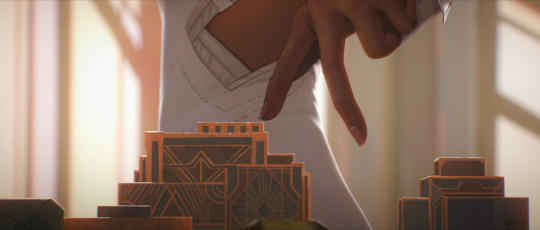
A neat thing is how it recalls the first scene of the kids jumping across the rooftops. But also, it shows where her head is at, she's actively thinking, she's a nimble thinker.
Then Elora tells her about Jayce, then she picks up the toy puzzle.

Mel: Hmm. This one.
Salesman: That's a, um... well, that's a child's toy.
Mel: Good.
And that tells you a lot too. She's had these two discussions running consecutively, and she's able to pick up and drop each one whenever. She knows what she wants. And also, that she wasn't just shopping for something for her own amusement, when she does something, it's with a purpose in mind.
Also you can see her wearing her family ring, the Medarda crest is at both the beginning and the end of the scene.
90 notes
·
View notes
Text
I absolutely adore all of Cait’s silly expressions in the storyboard

Like look at that mischievous grin

She was SO proud of herself hahaha


She’s so stick bug

My babies ❤️❤️

MY GIRL VI WAS STRESSING AND UR OUT HERE FOOLING AROUND AHAHAHAHAAH

She’s like OHH

This one is my fav one out of all of them
298 notes
·
View notes
Text





Arcane @ Annecy Festival - Poster & Banner by Fortiche
2K notes
·
View notes
Text

So someone with your eyes
Might come in time
To hold me like water
Or Christ, hold me like a knife
354 notes
·
View notes
Text
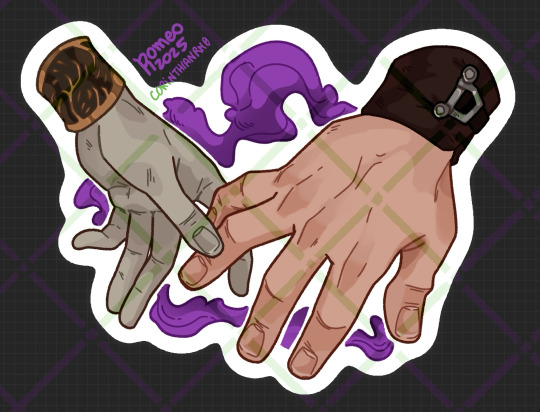
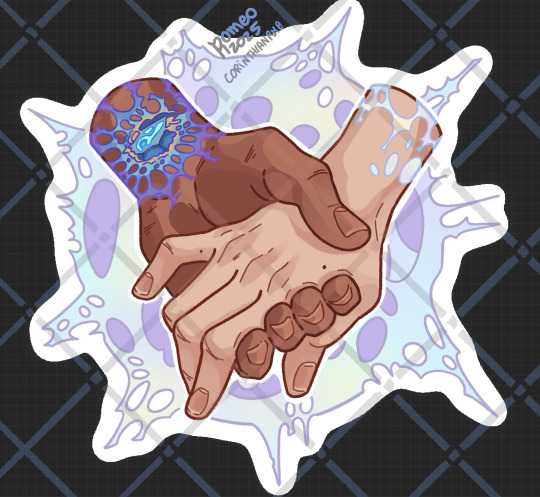
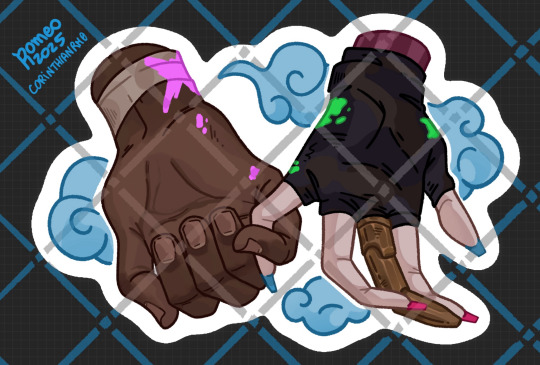
i think holding hands is one of the most romantic things
these will be keychains/stickers! still missing two ships........
510 notes
·
View notes
Text

TIMEBOMB IN CELEBRATION OF THE NEW MUSIC VIDEO!!!!
if u saw the last post no u didn't i forgot his facepaint LMFOAOAOA
ver without the heart and speedpaint below♡♡♡ vv

126 notes
·
View notes
Text


still a wip cause i'm unsure abt the background, but yay! i colored the print💋
682 notes
·
View notes
Note
The fact that Vi has half an hour more screentime in s1 is particularly bonkers if you consider that there's one episode that basically doesn't feature her (1x04) at all. (which isn't all that different than her barely being in 2x07)
That said, imo fiction isn't a democracy, something isn't better just because it is more equal. IMO stories can benefit from having a strong singular focus or point of view character without it having to be a traditional action superhero tale.
I do think that anybody should have seen even just based on s1 that expecting a traditional action hero storyline (whether "and then Vi heroically defeats the badguys Jinx and Silco" or "and then Vi turns around and heroically defeats Piltover and brings peace and contentment") was never realistic/the goal of the show.
But there's other story templates they could have followed (ie "and this is there the hero learns something about their misconceptions and reaches a better understanding of the world" or "this is where the protag realizes they were the problem all along, that they have gone too far and they go mad" [which actually is not that rare a story template for video games]) without abandoning Vi as the key point of view character. Or they could have cleanly switched from "season 1 is the season of Vi, season 2 is the season of [pick character]".
In the end, if Vi was exalted or "rich" in season 1 in screentime and she's more "normal" in season 2, it is still going to feel like a downgrade to people who attached to her. And at the same time, writers disagreeing and not feeling like they abandoned her is still also completely appropriate.
(personally I do think that s2 feels like the writers were torn between personal faves and that led to a more confusing structure, but at the same time this kind of "fanning out" from a clearly centered and focused experience to a more "spread out among the supporting cast" seems like a fairly normal process that you see in a lot of traditionally heroic/action adventure tv shows)
Any thoughts about Vi being "sidelined"? I certainly would've *liked* more screentime but I feel like alot of discussion boils down to "s2 Vi doesn't act like s1 Vi" which gets quite frustrating
I agree. I found these charts on twitter:
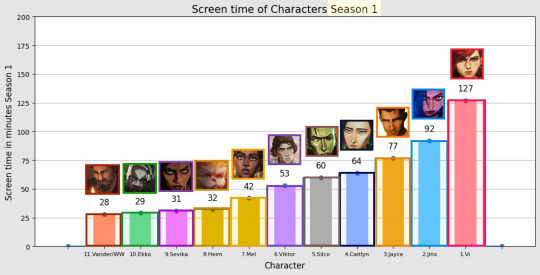

Vi clearly gets less screen time, but also, the divide between the top 3 characters' screen time is less dramatic in s2 than s1. You can hardly call that sidelining imo.
But more importantly than the quantity, I think the quality of her character development in season 2 is very interesting. I've written a few posts about it (1, 2, 3).
I really agree that the real problem that people have is the direction that her character took. From what I've seen, a bunch of people thought she was going to be The Hero, and were disappointed when her story didn't fit the Superhero Origin Story template. And yeah, it is frustrating.
It entirely misses the point. Arcane is not a show with a The Hero character. Vi's character arc is more interesting than the same story Marvel has been telling for 20 years. She's someone who organized her identity around being responsible for other people, impossibly responsible. And that's shown to be not a good thing! She can't carry that responsibility, and she can't meet the impossible standard it creates for her. And that takes her to a dark place that she then has to find her way out of.
18 notes
·
View notes
Text

Warwick hugging Jinx, Vi and Isha is my underrated fave of the annecy doodles.
47 notes
·
View notes
Text








she told him all about isha and he listened HE LISTENED AND HE HELD HER
130 notes
·
View notes
Text
Oh, I love the explanation for the "X" on both their chests.
Love how much the focus is on Isha and Vi is the hidden MVP giving a lot of depth.
JVKE, Arcane - Worlds Collide (feat. Reed Shannon, Livingston) (Official Animated Music Video)
223 notes
·
View notes
Note
I'm reminded of this video that covered exactly that moment.
youtube
Oddly enough, I think this actually shows the shortcomings of season 2 in a way (mind, I'm a relative s2 apologist) ... and it shows how insufficient terms like plot driven and character driven are.
In a lot of shows, when people are angry about "choppy writing" they say it's because the show is too plot driven.
At the same time, I think it's really, really, really clear that Arcane is character driven (we experience this mostly in the fights about character versus politics driven). All the "plots" in Arcane the writers care about are about characters and/or relationships.
When we see more in season 2 I think is that not all characters are created equal. The show cares about the character development of the main characters but not the supporting characters (some people will say that some main characters like Vi were affected, but I'm firmly speaking about supporting characters like Gert or Isha).
Some things in Arcane feel like they happen because some character needs it. Isha exists because Jinx needs to go through the character development of feeling like an older sister. Gert and Jinxers show Jinx veneration in this manner because Jinx needs to experience that kind of support.
These moments feel important for Jinx but they don't necessarily feel all the plausible in this world.
A strength of season 1 was that even most minor characters felt very plausible and recognizable (funny enough: the one I generally disagree about is that Marcus taking of Vi never made any sense other than "it had to happen", but it doesn't stick out becuase Marcus other motivations of "cares about his kid", "is corrupt", "kinda likes his old boss", "chaving against the council" feel so recognizable and normal people still perceive him as a plausible character).
Season 2 has more characters that feel to me like they come out of void to do the things the plot requires rather than in sum feeling like a minor person with a throughline. They just feel too convenient to me.
And no, it's generally not any concrete "this is unrealistic, no person would do that" (ie "a Zaunite kid wouldn't just attach to Jinx like that!"). They do broadly relatable things to the setting ("be angry at and fight Pilties!" or "happy to be rescued"). But to me a lot of them don't quite succeed into fitting together as a full person with their own goals.
It's not enough to make it a bad moment and it is very good if seen from Jinx's perspective. But I feel season 1 I think was a little better in trying to make each action mostly plausible from every angle rather than just from the angle of the main character. Even the various side pieces felt more "within the world of Arcane" rather than "piece in the character development of this character". I think s1 had a better hand in how they used their minor characters (and that goes from characters who only do a small thing (like the enforcers who are mean to Caitlyn or the traders who mouth off to Vander), to characters who do multiple small things but they feel plausible (like Huck selling out Caitlyn and Vi for drugs) to characters who have very vivid characterizations despite having a small role (like Mylo and Claggor)).
While s2 has a bunch of characters who to me feel weird (like Isha) or "well I guess it's still plausible even if it's not well characterized" (like Loris or Maddie or Mel's fake brother). They still have some that are uncontroversial/that are characterized and used about as much as it is needed (like Scar) and some that I think are well used (like Lest).
So character progression is still good, but imo world building is more uneven in s2 (and it's not that weird that maybe they put more effort in in season 1 when selling their world and defining it was likely one of the core goals).
you might have already talked about this but I can’t find it in the tags so forgive me if I’m just asking you to repeat yourself but what are your opinions on jinx becoming zaun’s symbol/hero in season 2? It’s quite divisive as many ppl think that it destroyed her chaos-agent/villainous status and turned her into a boring hero and others think it deserved a lot more screen time and was supposed to be the main focus of her arc? I love reading your thoughts, hope I’m not annoying you
I love getting questions, so thanks for asking! I don't think I've posted about this per se.
I will admit that when I watched the season the first time, I was a little surprised that the show moved on so soon from Jinx's relationship with the rebellion. But I just accepted that they were going somewhere else with the character, and once I saw what they were doing with her, it made sense to me.
Jinx becoming a hero/symbol is almost entirely about the psychological impact the experience has on her, imo.
Jinx's relationship with the rebellion is not about politics. She says outright that winning independence for Zaun was Silco's thing, it wasn't what she actually cared about. She cared about Silco, not Silco's politics. That's made very clear. If her arc was going to focus on politics, then her journey would need to involve starting to care about the struggle. But that's an entirely different journey than the one that she has been on.
Jinx's core trauma is accidentally killing the people she cares about. More broadly, it's the feeling that she's doomed to always screw up and hurt the people around her. Her journey is about dealing with that.
In s2e5, Jinx tells Vi that she sees helping Vander as a kind of do-over. But I think the idea that she could successfully have a do-over started with s2e4, and that was fundamental to her deciding to try to keep up with the do-overs.
Becoming a symbol for Zaun is meaningless to Jinx, because it happened accidentally. But what's not accidental is when she breaks everyone out of Stillwater.
In s2e4 people are in trouble, including someone she cares about. She makes a plan, and successfully executes it. No one is accidentally killed due to her actions. In that way, the experience is a step towards her overcoming her trauma.
At the beginning of season 2, Jinx thinks of herself as a curse. When Sevika tells Jinx that Isha was arrested, Jinx has an episode, again feeling like she jinxes everyone she's close to.
But then when she rescues everyone from Stillwater, there's this moment where everyone looks at her. Jinx is used to putting on a persona, and she tries to do so in this instance as well. "Here I am, your big fat hero." But then everyone looks at her like they really see her. They acknowledge her not as a symbol or persona, but as a person.
She did a good thing. She did a massively good thing. And she was acknowledged for it.
And you can see the impact it has on her. When Gert first puts her hand on Jinx's shoulder, she starts breathing heavily like she's about to panic. She looks both confused and emotional. Like she's never felt something like this before.












(I had to include Jinx's face journey here, it makes me cry).
So yeah, I think the point of Jinx becoming a symbol for Zaun and a hero was to give her that experience. So that she's able to approach Vi again, but this time with a stronger sense of herself, with a greater confidence. So that she and Vi can rebuild their relationship on a new foundation, one where Jinx doesn't invest everything in Vi.
And to a lesser extent, I think Vi seeing other people see Jinx as a hero was important too. And that the chaotic destruction that Jinx tends to bring with her isn't alway a bad thing. When Vi sees that mural of Jinx, placed next to Vander as a hero, that causes a huge amount of dissonance for her, which then pushes her into a confrontation with Jinx, as she struggles to understand who Jinx even is as a person.


Jinx becoming a hero/symbol was not an arc, and it would have never fit organically within what she already had going on. It was a moment in Jinx's ongoing struggle with her identity and trauma. It would not have made sense for it to get more screen time after it had served its purpose for Jinx's character development.
Regarding the notion that Jinx becoming a hero/symbol ruined her chaos agent/villain status, I have very little respect for that opinion, frankly. First of all, Zaun itself is a certain embodiment of chaos, Jinx becoming the hero of Zaun in no way undermines her chaoticness. Second of all, and more importantly, the opinion that Jinx should have been more of a villain, or more chaotic, seems to be based on the expectation that she was going to be a re-skinned version of Harley Quinn (as one semi-popular critical video essay explicitly said). An absolutely MCU-poisoned opinion. A take fit only for babies and philistines. Wild to be mad that Jinx is a complex and layered character.
Jinx's story was always about dealing with her trauma. Both the opinion that she should have been a revolutionary leader, and that she should have gone full-villain, ignore the substance of her story. Jinx being seen as a hero gave her the opportunity to see *herself* in a different light, so that she would have the ability to start making amends with Vi. It was always in service of her personal, individual story.
And like I mentioned above, it makes me cry, so I love it.
Thanks again for the question, I enjoyed answering it!
54 notes
·
View notes
Text

from "this devotion may contain side-effects" by @owepossum, an AU where Zaundads adopt baby Viktor — and this changes the trajectory of the revolution
2K notes
·
View notes




